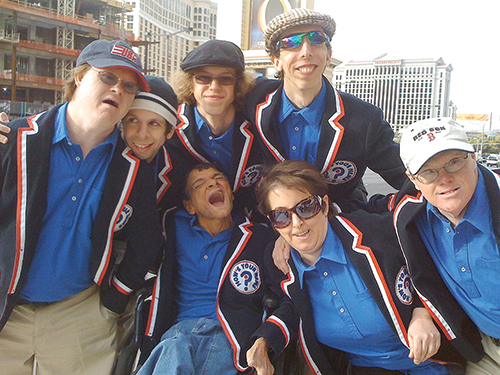
The Portland Center for Public Humanities is dedicating the entire month of May to bringing awareness to people with disabilities and the roles they play in the community.
As the month wraps up, the themed series ends on a high note with a screening of the documentary How’s Your News? followed by a discussion between the film’s director, Arthur Bradford, and Portland State English professor and author Paul Collins.
How’s Your News? is a documentary that follows a group of traveling reporters with various disabilities ranging from Down syndrome to spastic cerebral palsy.
The filmmakers emphasized that the material is not intended to be offensive.
Bradford has even said that “it’s OK to laugh. I work with all of these people, and they’ve got very distinct personalities,” he said. “Sometimes they do funny things, and that’s fine…we often do screenings with the reporters present, and they are laughing right along with everyone else.”
How’s Your News? began as video clips and segments made at a camp for adults with disabilities at which Bradford worked and taught classes.
The clips were a hit: “touching and vivid and unlike anything [I have] ever seen,” as Collins put it.
Eventually, Matt Stone and Trey Parker, famous for their satirical productions South Park, The Book of Mormon and Team America: World Police, saw the clips and were fascinated by what them. They got involved and helped fund the project, eventually becoming executive producers. The first How’s Your News? short documentary was made in 1998.
In 2002, a feature-length film chronicling the travels of five reporters on a cross-country trip was released. The group also had a brief six-episode series on MTV in 2009; it was very well-received and critics loved it. But the show was not picked up for a second season because MTV “needed to keep pushing for higher ratings with other shows,” according to the HYN website.
In 2012 the gang took to the streets again, this time hitting the hot-button topic of politics. Three reporters attended the Republican and Democratic national conventions; they spoke to all types of attendees, protesters, politicians and celebrities.
Prior to watching How’s Your News?: Election 2012, I would have had a hard time believing that politicians were more pretentious and arrogant than celebrities. It certainly says a lot about a politician’s personality when he flat-out ignores someone as pleasant as an HYN reporter.
If they managed to grab a politician’s attention, more often than not he used the excuse that he was late, or begrudgingly said a few words after being informed that this was a reporter with a disability.
The reporters seldom questioned politicians or attendees about their feelings on certain issues. Their questions and comments were instead earnest and innocent, such as “I’m a huge fan of yours,” or “Are you having a good time at the convention?” or “Do you enjoy swimming?”
In an interview with Stone and Parker, Parker made the observation that “most people, when they give an interview, they start to sound like they think they’re really important, and [HYN reporters] are able to make those people seem like they’re not important at all, and it’s great.”
It’s both endearing and humbling to watch them interact with people.
“This group of reporters can tell a certain story better than anyone else,” Bradford said. “They are so refreshingly uninhibited…[they] all have a certain passion and outgoing nature in common. For the project to be successful, it was important that the ideas originate from the reporters and not some outside influence.”
Watching the reporters work, it’s very easy to distinguish their personalities. I’ve found that being able to convey genuine, unrestricted personality in nonfiction or documentary film is a very rare talent.
The event taking place at PSU will consist of a viewing of the film followed two days later by a conversation with Bradford and Collins (who’s written several books, including a personal memoir, Not Even Wrong: Adventures in Autism).
The discussion following the film will be initially driven by audience questions.
Collins noted that the discussion will cover not only how people with disabilities are viewed but also how they see the world.
“It’s not just how people with disabilities are portrayed by others or viewed by others, but how they view us and each other,” he said.
How’s Your News?
Sceening: Tuesday, May 28, 7 p.m.
Smith Memorial Student Union, room 298
Discussion: Thursday, May 30, 7 p.m.
SMSU, room 236
1825 SW Broadway
Free and open to the public
Depicting both their challenges and everyday activities in a manner that isn’t completely asinine or “hackneyed,” as Collins put it, is incredibly difficult.
Bradford’s work comes off as genuine, honest and believable.
He strives first and foremost to “make a truly entertaining film,” not necessarily to “promote some kind of disability rights agenda,” the filmmakers said.
The event has been given the “Paul Collins Stamp of Approval”: “Bradford is consistently doing some of the best documentary work of anyone in the country,” Collins said. “He’s one hell of a filmmaker.”

